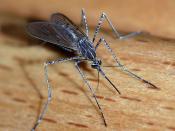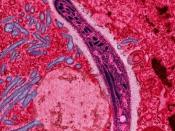The greatest health problem today is the spread of malaria. This airborne disease has been prevalent since ancient times where mosquitoes have been prescribed as the cause of numerous illnesses (Tolle et al, 2009, p. 97). Malaria is defined as a disease that is the result of a contingent of macroparasites that infects humans. In its totality, there are four different species of Plasmodium parasites that induce malaria. The female Anopheles mosquitoes are mostly held responsible for transmission and are numerous in number within Africa, Latin America and Asia (Stratton et al, 2008, p.854). For an individual to contract malaria, a mosquito carrying the airborne disease must pass it on into the individual's bloodstream in what is prescribed as a sporozoite. The human acts as a host allowing the parasite to live in both red blood cells and liver cells. Malaria is most deadly when red blood cells are obliterated and as a result leads to threatening symptoms.
As time passes, the parasites turn into gametocytes. When a mosquito bites the host, this gametocyte is consumed by the mosquito. The gametocyte then begins to mature and replicate within the new mosquito which ultimately leads to the continuation of its life cycle and spread (Gollin et al, 2007, p.1). Aside from transmissions through mosquitoes, malaria can also be passed on through sharing contaminated needles, organ transplantation and blood transfusions. (Tolle et al, 2009, p.98 )The main factor that establishes malaria as the greatest health problem today is the number of individuals that have acquired this disease. It is the most important parasitic disease currently afflicting the human species (Tolle et al, 2009, p. 98). The World Health Organization (WHO) has stated that malaria has resulted in 300 million accounts of "actute illness" and has subsequently lead to the deaths of over...


